Brian Roland, C. C. C. 2/10/2008
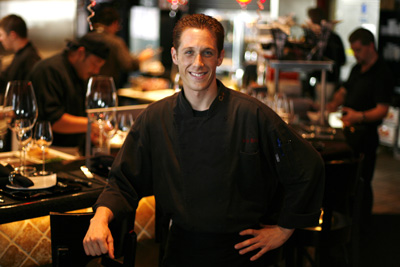 There are many who have a certain smoothness of style on the outside, but when it comes to substance they are found wanting. On the other hand there are those who bring great talent, ability and character to the table, but lack the polish and shine to make them stand apart from the rest. On rare occasions raw talent and depth of character combine with style, panache and charisma to produce an individual you canít help but be drawn to.
There are many who have a certain smoothness of style on the outside, but when it comes to substance they are found wanting. On the other hand there are those who bring great talent, ability and character to the table, but lack the polish and shine to make them stand apart from the rest. On rare occasions raw talent and depth of character combine with style, panache and charisma to produce an individual you canít help but be drawn to.Brian Roland encompasses all this and more. Taking over the Executive Chef reins at Cru, he has successfully steered it into one of the hottest and most sophisticated Ďmust go toí destinations in Southwest Florida. Graduating in 1999 with top honors from CIA in New York, he began his training under the tutelage of Chef Patrick Verre, where his love for food became a passion. After working for world renown Chef Daniel Boulud in NYC, he helped opened Chop City Grill in Bonita Springs as Executive Sous Chef, and later as Executive Chef, before coming to Cru. I had a chance to sit down with him and get to know him on a more intimate level, outside of the controlled frenzy of his open kitchen.
Gourmet Girl: Rather than doing the same old, cookie cutter, what's your favorite food, spice, etc. interview, my readers and I would like to get to know Brian Roland.
Chef Roland: Sure.
Gourmet Girl: Share with us what makes you passionate about food.
Chef Roland: Food is so versatile. Iíll source out the best farms or ranches in the United States to ensure that my clients are getting the best product. When I get this amazing product, it not only makes my job easier, it really gets me into the food. I benefit from the flavors and the intensities of these products because I feel like the suppliers put their heart and soul into creating the food all the way down to the soils, or the feed and care that they give the animals. Iím not having to focus so much on making the food taste good. Even though that is a big part of it, when the ingredients come to you already natural and great tasting, that feeds my passion.
GG: What makes you get up in the morning and say, "Iíve got to get to Cru?"
CR: The restaurant business for me is way more than just the food. Iíve learned that a lot more being here at Cru. I really built a reputation here as the chef and people recognize Cru and me at the same time. I can now say I am a part owner of it.
GG: Youíre known for that personal touch. What appeals to you about this?
CR: I have a chance to touch every table. To really get to know my guests and build relationships with them. We have an amazing reservation system, Open Table. I have the ability to put notes about guests in there that enable us to know a little bit more about them for future dining experiences. For me, being in an open kitchen is like being on stage.
GG: It puts more pressure on you though.
CR: It does. Every movement that we make is being watched. If the kitchen is not clean or the servers are feeling tired that day and theyíre leaning or resting, diners can see that. Itís important that every teammate is aware at all times and that they are attentive to detail.
GG: I understand one of your favorite books is, 'On Food and Cooking.' Why?
CR: Whatís unique about ĎOn Food and Cookingí is that it is a regular text book and thereís really minimal photos in it. There is a lot of science that goes into cooking. I like to know why things happen.
GG: Explain that a little.
CR: For instance, why, when you cook a piece of asparagus and you put salt in the water does it turn bright green? You put some type of acid in there, like lemon juice, it turns army green or darker. Knowing why, an alkaline or an acid react differently with a vegetable. Molecular gastronomy, the science of food, more so now I think, is becoming a focus of chefs.
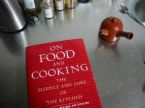 GG: So molecular gastronomy really is a trend that is out there right now?
GG: So molecular gastronomy really is a trend that is out there right now?CR: Itís a big trend right now, and not just because of' 'On Food and Cooking.' Itís really interesting to watch and learn about it. A lot of chefs are very much into it.
GG: On that note, what do you think is a trend that is passe...enough already?
CR: Crusting of fishes. This is only my opinion, but that trendy Florida cuisine, I canít stand it anymore because itís everywhere.
GG: Is it everywhere because we are a tourist area, and those that come down from the Midwest or the Northeast are looking for that ?
CR: Yes, thatís a very good point. That's why chefs donít want to push it out, because people coming from New York can get New York food all the time at home. Why would they seek out that same style of food here? Some restaurants are limited to that.
GG: Everyone asks about your influences. Since I know a little bit about who they are, I'd like to know how each has influenced you, so we'll take them one at a time. You worked for one of the top chefs in the world, Daniel Boulud, in NYC. Tell me about that.
CR: I was getting ready to open Chop City Grill in Bonita Springs. They had asked me to be a part of the opening team as the Executive Sous Chef. I knew I had a year or so before the opening, so I got in touch with Patrick Verre who happenes to know Daniel and he set up an interview. Iíll tell you, those 8 months really opened my eyes to understand how much love and effort has to go into each individual ingredient on a plate. I've developed a better understanding of that. It was also my first experience working in Manhattan. Itís very demanding, very exciting. I went home ready to cry some nights.
GG: It's Daniel Boulud, that has to be intimidating.
CR: Very intimidating, but that's the demand of a famous NY restaurant. They have expectations and their diners have expectations, as you well know. They have to maintain a high level of quality.
GG: I assume that most of that thinking comes from France, because of the clientele they are working with. It's also understandable. That kind of pressure comes with the territory in high profile restaurants.
CR: Exactly.
GG: What about Patrick Verre?
CR: Patrick Verre is by far still to this day my biggest mentor. He influenced me not only on protein, but on life. Macrobiotically known, he studies the 5 Chinese elements; Wind, Earth, Fire, Land, and Water. Heís very much into Yin and Yang and how to balance things out in your life. He is very spiritual, but that aside, he is the best chef Iíve ever worked for. It's where I learned to build relationships. He made it a point to connect with you one-on-one. It broadened my horizons because he was such a diverse person and he gave me the insight and the ability to see other things. That was so special to me, especially at such a young age. That built my confidence and my excitement and enjoyment of cooking food. I worked with him for four years.
GG: Tell us about Thomas Keller.
CR: Iíve never met him personally but it's because of his reputation that I decided I wanted to check out his restaurants. Iíve been a fan of his cooking and his cookbooks. Iíve eaten at Per Se in the Time Warner Building (NYC) and aside from Grant Achatz, at Alinea (Chicago) thatís my most memorable dining experience. Heís very cutting edge, very Nouveau. He tends to have an insight and to be able to look into the future and know what kinds of trends are coming up and how to be ahead of the game. I really admire chefs or anyone in any industry that have the ability to foresee whatís on the horizon and be a part of trend starting.
GG: You mentioned Grant Achatz.
CR: He was Thomas Kellerís sous chef at The French Laundry and he opened up his own place in Chicago, Alinea. I went there for a 16 course tasting menu that wowed my senses in more ways than I can ever describe. He put so much thought and effort into not only the plate with fresh ingredients, but the process in how you eat these things. He presents a whole package. He created this lavender air that was put inside an airline pillow. The server stuck this pillow right in front of you and you're looking at it asking, "What is this?" Other servers come and place plates on top of it. As the weight of the plates increases, you get this aroma of lavender that just keeps coming out at you. Itís sensory overload.
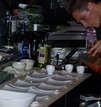 GG: Much like your ĎTake this as a shot." (Referring to his Amuse served prior to the start of my meal at Cru).
GG: Much like your ĎTake this as a shot." (Referring to his Amuse served prior to the start of my meal at Cru).CR: Absolutely right. I like to be more interactive because it really adds to the ambience and the feel of the meal. I learned a lot from that dining experience. I admire his ability and know how. He then teaches his staff, who in turn instruct guests how to do these things.
GG: So weíll be looking for something like this in the future from you, very creative.
CR: Absolutely. Itís outside the box. De-constructive anything, is also a big trend right now. I recently saw a de-constructed Caesar Salad. They made a lettuce soda, an anchovy ice cream, all the flavors in totally different forms. Itís not easy to do or to make it work, which is why it's so unique.
GG: Iíll be looking for that from you for sure. So, what did you want to be when you grew up?
CR: If it was before I went to high school, I wanted to be a dentist like my dad. He's my hero, my backbone, my inspiration. He keeps me on my feet and I really aspired to be like him. He is so successful and I love him to death.
GG: Originally from South Brunswick, NJ, what influence did your family have on your perception of food?
CR: Growing up I lived with my mother until I turned 18, but I had a really good relationship with my dad. My mother taught me how to cook and grow herbs and vegetables in the garden. When I got to my teens my first job was in a pizzaria. The chef saw my interest and my eyes on all the things he was doing. He asked, "Do you want to help me out with some of this?" Junior year of high school I came home and said , "Mom, dad, I think this is what I really want to do as a career." My family has always been so supportive and no matter what it is in my life theyíve given me the know how and the ability to recognize whatís right for myself. They trust my decisions, which is very important. Thatís part of the family influence.
GG: If not a chef, Brian Roland would be...
CR: I would probably have a seat on the stock exchange. I know thatís so far out there. Iím not addicted to the stock market as much as I used to be (laughs). I used to day trade. It can be exciting , but it can also consume you too. You can go crazy with it.
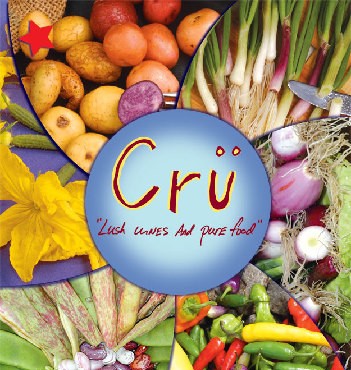 GG: Has your family eaten here (Cru)?
GG: Has your family eaten here (Cru)?CR: They have.
GG: And?
CR: Itís their favorite restaurant! I think they are mostly impressed with seeing how far Iíve come. Every little article that comes out, they blow it up, put it on a DVD and give it to everybody. My great Aunt Jean recognizes me as a son and she talks to people about me as if Iím one of her own. That kind of support keeps me going. If Iím having a stressful day, I call and tell them. They listen and they make it better. Theyíre great.
GG: While you were attending CIA, you were inducted into the International Gastronomic Society, 'The Chaine des Rotissuers' as a Rotissuer. What was the dish that gained you membership?
CR: The unique thing about that is, it wasnít for my culinary ability. It was the relationship I had with the head Consigliere. He was an instructor at the CIA. He saw how much passion I had in the kitchen and in the classroom. The Society does one induction dinner a year, where they induct 5 or 6 people at a time, and he chose me. Itís the whole sword, swearing you in, chain with a medallion thing. Just like a knight. It was a huge honor.
GG: Your culinary tour of Europe. How did that change the way you prepare food or did it?
CR: European ingredients. It really brought them to life for me. I remember when I was in Barcelona, Spain, we went into a market where they let you taste things right there. They had a meat market, a fish market and vegetable market. All in this huge warehouse. It was like a culinary dream. I was on cloud nine! It helped me understand a lot about the culture, different countries and the ingredients. I think to be a well traveled chef is very important.
GG: What was the greatest transition from school to a real world kitchen?
CR: Working with Patrick Verre. I am 19, wearing the reputation of the CIA on my shoulders, going into my first real world kitchen. When people hear youíre a graduate of the CIA, they have this expectation that youíre going to be the best of the best. Iíd come home and say "Dad, Iím nervous, I donít know what Iím doing. Theyíre doing things Iíve never seen before. Iím getting yelled at." Coming out of school I thought I knew all I needed to know. It took three years for me to feel comfortable. Applying what you learn at school, you have to be in the right environment, with the right people. You also have to have the know how yourself. Hands on was the biggest thing for me.
GG: What is the most amusing thing that has ever happened to you in a kitchen?
CR: Iíd say working at Daniel. They bring you in for what they call a Stage (pronounced: staj ), a three to five day internship to check you out. Day one, the chef brings me down into the dungeon, their basement, and brings out 6 cases of Muosseron mushrooms.
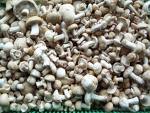 My job for the day was to pick every stem of every mushroom and reserve the stems and the caps. Okay, not a big deal, my first couple of hours, Iím having a great time. Here I am, applying for a job at Daniel in NYC and I'm downstairs in the dungeon picking mushrooms!
My job for the day was to pick every stem of every mushroom and reserve the stems and the caps. Okay, not a big deal, my first couple of hours, Iím having a great time. Here I am, applying for a job at Daniel in NYC and I'm downstairs in the dungeon picking mushrooms!Three days later, still picking mushrooms, Iím wondering, "Is this going to be the only thing Iím going to be doing or are they going to give me something else at some point?" Apparently I did a good job, because at lunch time on day three, the chef pulled me upstairs to the office and said, "We wanted to see your ability to follow directions, your endurance, your focus, your concentration and your love for what you do. Weíre impressed with what we see, weíd like to promote you to the lunch line."
GG: Other than creating good food, what are the traits and qualities that make a successful chef?
CR: Chefs need the ability to get themselves out of a poor situation. Thereís a lot of strategy that goes into being a chef. Not only are you using your knowledge of cooking, you have to be able to oversee every key component of the restaurant. You have to build relationships with people. If you donít have a good relationship with your staff, theyíre not going to want to perform.
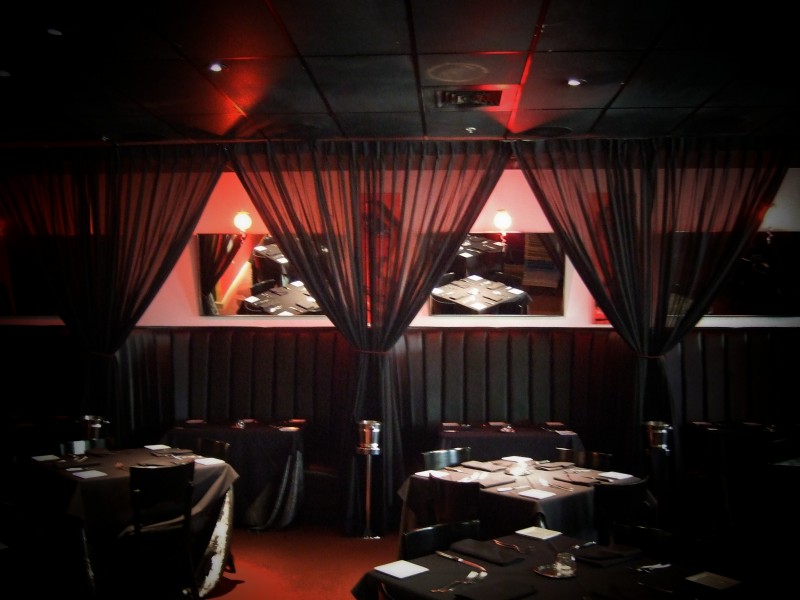 GG: Letís talk about Cru. What is Brian Roland's vision for Cru?
GG: Letís talk about Cru. What is Brian Roland's vision for Cru?CR: To maintain the reputation of 'Lush wines and pure food.' Also, to maintain the relationships with the people that have been coming for four years. I want to build more national recognition. Do some of the things that restaurants in New York, California and Chicago are doing, in terms of food and service. I really want to put Ft. Myers on the map. Cru began that prior to my start here and Iím hoping to broaden that a lot more.
GG: Speaking of Ft. Myers, give me your thoughts about the SW Florida market.
CR: Our clientele is very adventurous, and they are willing to be educated. Not everyone, but I think that is part of the challenge. A lot of Floridians are used to the Floribbean cuisine that you get everywhere. Crab cakes, blackened grouper, all the items on every menu down here. The challenge is offering something that the guests will recognize, but doing it in a way that allows you to recreate it at the same time.
GG: Did the fact that you used to visit your grandparents here and already knew the area give you a level of comfort with the clientele you deal with now?
CR: It did. I was right out of school. I wanted to get myself into as many different places as I could, so I could learn. I got a sense of what Ft. Myers is all about. Back then, the macadamia nut encrusted grouper and those types of things was what I was into. Itís what I needed to know at that time. It was new to me so I appreciated that about Florida.
GG: If this restaurant were in New York, what would you do different? Or would you do anything different at all?
CR: Iíd have a larger staff to give me the ability to put someoneís hands on everything. I think thatís very important. I think our vision can work anywhere. I love our style of food. I donít want to do very high volume at any point. More than say 200-250 covers, although that's still is a high volume establishment. We are probably averaging 150 on the weekends which is a really nice number for us.
GG: So quality is more important to you than quantity?
CR: Much more. Service also. You can see when a server is stressed, they canít give you the attention you need.
GG: It was very evident when I was here that your staff is well trained. There seems to be that nice team cohesiveness here. What do you expect from your chefs?
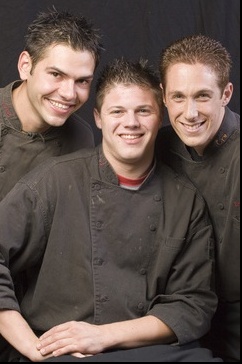 CR: Ability to handle stress is key. They need to be able to work with deadlines, work in a high paced environment, work with servers, adapt and work with demanding clients. Honestly, Richie and Josh, currently, are better chefs than I am. They have their hands on everything all day long. They have such amazing culinary ability. Tim, I found as an intern from the CIA. He is a special guy. I handed him the reins as the Pastry Chef and told him "I want you to focus on pastry," and he just ran with it. I've built this great relationship with them and I don't have to demand the quality and consistency. They know it, understand it, and they continue to do it.
CR: Ability to handle stress is key. They need to be able to work with deadlines, work in a high paced environment, work with servers, adapt and work with demanding clients. Honestly, Richie and Josh, currently, are better chefs than I am. They have their hands on everything all day long. They have such amazing culinary ability. Tim, I found as an intern from the CIA. He is a special guy. I handed him the reins as the Pastry Chef and told him "I want you to focus on pastry," and he just ran with it. I've built this great relationship with them and I don't have to demand the quality and consistency. They know it, understand it, and they continue to do it.GG: What is the one trait that they all share?
CR: Actually it's two. Drive & Passion.
GG: What dish would you say is synonymous with Cru?
CR: There are some staple dishes, the Spanish Chicken and rice and Paella that have been here since day one. But I think it's the style that draws people, more than any one dish. It has a lot to do with the interactive dining experience.
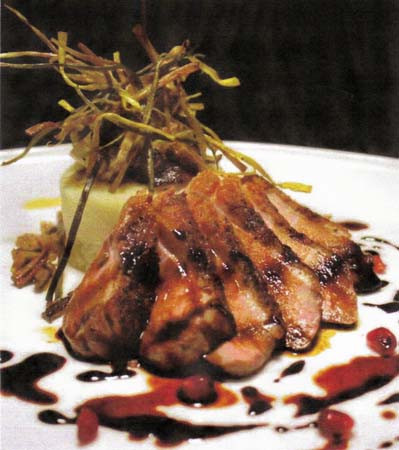 GG: On your current menu what is your favorite dish?
GG: On your current menu what is your favorite dish?CR: I love the duck. (Duck Breast-Truffled Pomme Puree, Wild Mushrooms, Espresso-Pomegranate Gastrique)
GG: Your history says French is your favorite cuisine.
CR: French is the foundation of everything. The majority of the preparations that we produce every day are French.
GG: Yet there is such a mix on the menu. Is everything fusion in some way?
CR: Yes, I think it is. Unless you're going take traditional cuisine like a Spanish preparation of a dish from start to finish, you will find something that's French in all of them. It's a very eclectic menu, with a great variety of fresh seafood, steaks and game meats, like duck breast and ostrich. We also have a lot of artisanal meats and cheeses.
GG: You are doing what's called a Protein Series. Tell us about that.
CR: The idea behind the Protein Series was to offer an event that excited and educated people in a different form. We educate ourselves too because there are so many different ways that a protein can be prepared. We decide on a protein ahead of time and we build the menu around it . I have a lot of fun coming up with different versions of that particular protein. Itís a very educating event for people that are really into it. Itís a lot of fun for both them and us.
GG: What do you have planned for your 4th anniversary, or do you?
CR: Weíre going to have live entertainment during dining hours by Chris Workman. As people pull up there will be brand new BMWís out on the lawn. Thereís also going to be a big ice sculpture out there. Itís going to say "Cru 4 Year Anniversary" all lit up with a red carpet and stanchions. Lucas Meeker is a very well known wine maker and he has agreed to come for this event, which is a huge honor. The Reserve Cigar Bar will be out on the mall side patio with cigars and Remy Martin. Van Gogh is going to do drink specials and another ice sculpture inside. DJ 007 will be spinning from 10 to close. Weíre really excited about this event.
GG: Ok I guess we have to include some of those cookie cutter questions, so bear with me. What do you eat at home?
CR: I donít. Well, just breakfast. Sometimes, if Iím feeling good Iíll make some eggs. Cinnamon Toast Crunch occasionally. A treat. Takes me back to my roots as a kid. Grains, Raisin Bran or cereal bars, because theyíre fast and easy.
GG: When you have the time where do you like to eat?
CR: Any of Haroldís restaurants. Haroldís on the Bay, H2. Heís very creative.
GG: What is a cuisine that you will flat out not cook?
CR: There isnít one because Iím willing to try anything. Currently I take styles and ingredients and flavors from many different cuisines and put them all together.
GG: Why donít you like caraway?
CR: (Laughs) Itís not that I donít like it. I had to say something for that interview (NEWS-PRESS). I really did. It just doesnít have that much to offer. Itís found in certain breads. I do like rye bread, donít get me wrong. Iím a great Reuben Sandwich fan, especially with really good rye bread, but itís not something that I crave. It's just that I've never said "I need to have caraway. Now!" (laughs again) You know?
GG: What kitchen tools, besides your knives, canít you live without?
CR: Good ingredients. They are a huge tool for a chef. I also have an amazing blender called a Vit-A-Mix. You can make smooth purees out of almost anything.
GG: Tomorrow you leave the world for good, whatís your last meal, including dessert?
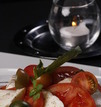 CR: Iíll have a cheese course and stone crab claws for an appetizer. I love both. Salad would be really ripe and flavorful heirloom tomatoes and buffalo mozzarella cheese. Drizzled with olive oil and salt and pepper. Entree? Surf and Turf. For dessert it would definately be ice cream. Something with a lot of texture. Something gooey.
CR: Iíll have a cheese course and stone crab claws for an appetizer. I love both. Salad would be really ripe and flavorful heirloom tomatoes and buffalo mozzarella cheese. Drizzled with olive oil and salt and pepper. Entree? Surf and Turf. For dessert it would definately be ice cream. Something with a lot of texture. Something gooey.
GG: Tell us something about yourself, your career, or your profession that is a must know for those entertaining a culinary career?
CR: You have to be dedicated. The passion can be developed over time. You donít have to have it going into it. My passion grows from within. Itís very fast paced, I think the food service industry is unlike any other. It opens your eyes to a lot. Expect the unexpected and recover when it happens.
GG: Youíve gone through so much trial and error professionally. You dabbled as a kid at home. Out of all of that experience what is the one tip you can give for the at home novice.
CR: You need to feel the ingredients. Cooking is way more than just getting an ingredient, applying a culinary skill, tool or application to it and presenting it on a plate. Cooking is all about timing. About knowing whatís going on with the food. Letís go back to the cooking book, know why things are occurring. I feel and understand it while itís occurring.
GG: Youíve established yourself at a relatively young age, with most of your career ahead of you, what do you see on the horizon for Brian Roland?
CR: I may not be up there like Emeril Lagasse, giving it the old Bam!, but I would love to do something with the food network. Either behind the scenes or someday having my own cooking show. I love to educate myself and others.
I know what I want in life. I know when I get to the place that I want to be, I want to have a family and be able to spend all of my time with them. Hopefully, I'll have the right people in the right places to run my restaurants at that point. But I know down the road I do want to own a restaurant.
GG: Chez Brian?
CR: (Laughs) Something like that, and donít ask me the style of food. Although, it will probably be similar to Cru. I never want to be limited or say, ''That doesnít fit in my cuisine line."
GG: So your answer to "What style would it be?" is "My own."
CR: Thank you, perfect. I want to keep learning more about myself, learning what else is out there and just going out and doing it! I donít know where itís going to be, or what itís going to be, but like you just said, I do know I want it to be something to call my own. Soon.......I'm ready.


